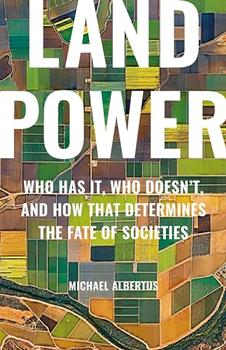
Who Has It, Who Doesn't, and How That Determines the Fate of Societies
by Michael Albertus
An award-winning political scientist shows that a society's path to prosperity, sustainability, and equality depends on who owns the land.
For millennia, land has been a symbol of wealth and privilege. But the true power of land ownership is even greater than we might think. In Land Power, political scientist Michael Albertus shows that who owns the land determines whether a society will be equal or unequal, whether it will develop or decline, and whether it will safeguard or sacrifice its environment.
Modern history has been defined by land reallocation on a massive scale. From the 1500s on, European colonial powers and new nation-states shifted indigenous lands into the hands of settlers. The 1900s brought new waves of land appropriation, from Soviet and Maoist collectivization to initiatives turning large estates over to family farmers. The shuffle continues today as governments vie for power and prosperity by choosing who should get land. Drawing on a career's worth of original research and on-the-ground fieldwork, Albertus shows that choices about who owns the land have locked in poverty, sexism, racism, and climate crisis—and that what we do with the land today can change our collective fate.
Global in scope, Land Power argues that saving civilization must begin with the earth under our feet.
"Land Power is a fascinating book on the power of land inequality in history and the large land reshufflings of the past and present. It is a must-read to think about the coming struggles over land in the 21st century." ―Thomas Piketty, New York Times–bestselling author of Capital in the Twenty-First Century
"Land Power is an important book dealing with a timeless but underappreciated issue: who owns the land. It illuminates how social hierarchies and injustice have been historically built around unfair land rights and provides a fascinating array of examples of how reshuffling land can help tackle these pressing issues." ―Francis Fukuyama, author of Liberalism and Its Discontents
"With a sweeping scope across history and around the world, Albertus offers his readers a novel view on the rise of the modern world. Land—who controls it, who owns it, who works it, and efforts to alter all this—sits at the basis of social power and political power in the modern world." ―Daniel Ziblatt, New York Times–bestselling coauthor of How Democracies Die
This information about Land Power was first featured
in "The BookBrowse Review" - BookBrowse's membership magazine, and in our weekly "Publishing This Week" newsletter. Publication information is for the USA, and (unless stated otherwise) represents the first print edition. The reviews are necessarily limited to those that were available to us ahead of publication. If you are the publisher or author and feel that they do not properly reflect the range of media opinion now available, send us a message with the mainstream reviews that you would like to see added.
Any "Author Information" displayed below reflects the author's biography at the time this particular book was published.
Michael Albertus is professor of political science at the University of Chicago. The author of four previous books, his writing has appeared in the New York Times, Washington Post, Atlantic, Foreign Affairs, and elsewhere. He lives in Chicago, Illinois.
Your guide toexceptional books
BookBrowse seeks out and recommends the best in contemporary fiction and nonfiction—books that not only engage and entertain but also deepen our understanding of ourselves and the world around us.